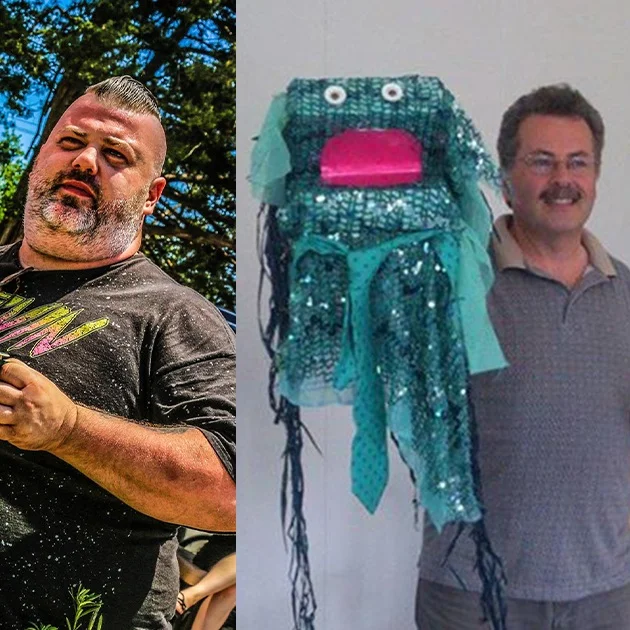In VSC’s Desistance Theatre Project, former incarcerated citizens discover their artist identities and a sense of belonging
Virginia Stage Company launches “Desistance Theatre Project” as part of its Public Works Virginia offering of community programs. With a commitment to creating inclusive and welcoming spaces for all to experience the transformative aspects of theatre, VSC and Public Works Virginia support the lived experiences and challenges of non-violent, adult male ex-offenders.
Matthew Bernier, MCAT, ATR, a registered art therapist, artist, puppeteer, and Associate Professor in the Graduate Art Therapy and Counseling Program at Eastern Virginia Medical School, describes the word “desistance” as the mental process of committing to a life free of criminal activity and reincarceration.
“Artists gain a sense of belonging by committing to to an expressive theatre arts troupe,” explains Bernier. “They develop artist identities through expressive arts, such as visual arts, puppetry, music, movement, poetry and theatre, and the collaborative experience to express their life stories and to envision a successful future as they to commit to desistance.”
Bernier envisions the participants can understand their own experience, see themselves as actors rather than spectators, as people with agency and control, and take positive control of their situation. “The potential risk for repeat offending and recidivism is very high, especially when ex-offenders are struggling to meet basic needs such as housing and food and to find and keep employment to pay for them,” says Bernier.
He leads the project with visual and conceptual artist Charles Rasputin. Known for creating and developing work for public viewership and cultural consumption, Rasputin’s current work explores immersive environments, shadows and light, and the creeping darkness that dwells within each person.
“Sharing the resource of creative outlets and art in general as a therapeutic medium is important in the context of incarceration and desistance,” says Rasputin. “Artistic identity allows one the opportunity to develop oneself outside of the box of society or the system.”
Rasputin explains that creating an alternative identity for oneself is often an irrevocable part of street life and allows the user to act outside of their social contract. “By reversing this and using the creative identity as a way to exist outside the parameters of criminal enterprise or addiction, or any myriad of paths to incarceration, it allows our creatives with criminal pasts opportunities to learn self-awareness, self-esteem, and hold onto the spice and virtue of outlaw thinking through art and creativity without needing to fall back into actual outlaw behavior.”
Themes the group explore include:
substance addiction/abstinence/sobriety
employment/unemployment
homelessness
family responsibilities/conflicts
relationships
past history of child abuse/neglect and/or domestic violence
past criminal and gang activity
PTSD, grief/loss, and other mental illness
medical illnesses or injuries
effects/impact of imprisonment
compliance with Conditions of Probation Supervision
stigma of being an ex-offender/felon
“Often times in outlaw culture one learns to be hardened, poker-faced about emotion and myopic about human connection. Art as a collaborative exercise allows us to let go of these preconceived notions and in doing so lets one create an alternative identity of exploration and growth,” says Rasputin.
Desistance Theatre Project will culminate in a public presentation of its artists’ works in May 2019.
Desistance Theatre Project meets on Sundays at Selden Market from 2pm - 5pm. For more information, contact berniemg@evms.edu or charlie@alchemynfk.com.


